Cinema Course Descriptions
Descriptions of all LACC Cinema Courses Included on this page:
Cinema 1 - Introduction To Motion Picture Production
Cinema 2 - Beginning Motion Picture Workshop
Cinema 3 - The History Of Motion Pictures
Cinema 4 - History Of The Documentary Film
Cinema 5 - Introduction To Screenwriting
Cinema 6 - Motion Picture Photography
Cinema 7 - Advanced Cinematography And Creative Techniques
Cinema 9-1 - Beginning Motion Picture Sound Production
Cinema 9-2 - Intermediate Motion Picture Sound & Post-Production Sound Design
Cinema 10 - Introduction To Film Directing
Cinema 17 - Advanced Motion Picture Post-Production NEW
Cinema 18 - Introduction to Film Genres
Cinema 20 - Business Of Motion Picture Production
Cinema 25 - Producing Digital Video Features
Cinema 32-1 - Editing Fundamentals I
Cinema 32-2 - Editing Fundamentals II
Cinema 33-1 - Digital Video Production Workshop I
Cinema 38-1 - The Motion Picture Grip
Cinema 38-2 - The Motion Picture Electric
Cinema 60 - Entertainment Industry Careers Below-The-Line Production Skills NEW
Cinema 501 - Media Aesthetics & Design for Film and Digital Media
Cinema 911 through 941 Cooperative Education and Work Experience
Law 33 - Law and the Media
Note: Cinema 1, 2, 3, and 4 or Cinema 18 are prerequisites for most of the LACC cinema classes. We recommend that you take them the first semester.
CINEMA 1 - INTRODUCTION TO MOTION PICTURE PRODUCTION (3 UNITS-UC/CSU)
(4 hours per week during Fall and Spring Semesters)
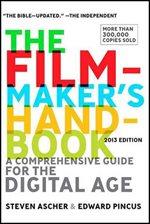
A comprehensive introduction to basic film and video production techniques and equipment. Proper procedures are explained for the use of digital and film cameras, lenses, filters, film stocks, lights, microphones, audio recorders, editing systems, and other motion picture equipment. Attention is also given to production planning and post-production as well. Cinema 2 should be taken concurrently. Required of all Cinema majors; open to all others. Note: This class is offered in Face-To-Face and online formats
This class leads to several certificates.
Cinema 1, 2, 3, and 4 are prerequisites for most of the other LACC Cinema classes. We recommend that you take them all the first semester so you may continue seamlessly through the program.
Required textbook: The Filmmaker's Handbook: A Comprehensive Guide in the Digital Age by Ascher and Pincus, 2013 or 2019 ISBN:978-0-452-29728-9
CINEMA 2 - BEGINNING MOTION PICTURE WORKSHOP (3 UNITS-UC/CSU)
(5 hours per week during Fall and Spring Semesters)
Introductory workshop in practical filmmaking. A lecture and laboratory workshop including script, storyboard, direction, cinematography, sound, and editing techniques. Each student will be responsible for making short films. Required of all cinema majors. Open to all others. We suggest taking Cinema 1 concurrently where much of the technical information will be taught.
Cinema 1, 2, 3, and 4 are prerequisites for most of the other LACC Cinema classes. We recommend that you take them all the first semester so you may continue seamlessly through the program.
This class leads to several certificates
During the semester, each student will write, direct, and produce three films on digital video. While the school has equipment for student use, the inventory is not large. While we have a limited number of cameras (Zooms and Canon Vixias) and tripods (Bogens) that you can check-out, we suggest you purchase your own equipment for convenience. We have editing stations (iMac's with video editing software), so if you don't have your own editing system, we have stations for you to complete your projects. There is no need to buy expensive equipment for this class; any smart phone that shoots video, digital video camera and recent computer (PC or Mac) will generally be just fine although there may be some technical limitations. Consult with your instructor or technical staff. This equipment can be used in subsequent classes as well. We suggest that you withhold purchasing any equipment for this class until you attend the first class meeting to get more information. (Please note: While we can give full technical support for our equipment, there will be limitations with support for your own personal system.) Cinema 2 is offered both day and night each semester.
For your convenience, there are several sections of this class each Fall and Spring. No required book, but the Cinema 1 book "The Filmmakers Handbook" might be referenced. Note: This class is offered in Face-To-Face and online formats
Required materials: Smartphone or other video camera or DSLR. Paper for note taking, SD memory card(s) for the LACC Zoom & Vixia cameras. You may incur other expenses when producing your projects, but costs vary depending upon circumstances. If you purchase your own digital video camera, camera tripod, and computer with software, the costs can be considerably higher depending upon the equipment you choose. Many students use smartphones with video capacity for this class
CINEMA 3 - THE HISTORY OF MOTION PICTURES (3 UNITS-UC/CSU)
(4 hours per week during Fall and Spring Semesters)
History of the development of motion pictures, with examples, from their beginnings to the present day. Emphasis is placed on the American feature film. Required of all first semester cinema majors; open to all students. Note: This class is offered in Face-To-Face and online formats.
Cinema 1, 2, 3, and 4 are prerequisites for many of the other LACC Cinema classes. We recommend that you take them the first semester.
This class leads to several certificates
In addition to lectures on film history, fiction films from the silent era to the modern day will be screened weekly and discussed in our theater. Students will write papers and/or take tests. This class is offered both day and evening each semester. Note: This class is offered in Face-To-Face and online formats
Required textbook: A Short History of Film by Dixon and Foster ISBN: 978-0-8135-4270-6
Other materials required: Paper for note taking. Some instructors will require Scantron forms.
CINEMA 4 - HISTORY OF THE DOCUMENTARY FILM (3 UNITS-UC/CSU)
(4 hours per week during Fall and Spring Semesters)
The development of films dealing with the truth and reality TV programing. Film types seen and discussed include: historical, animated, propaganda, educational, commercial, cinema verite and direct cinema. Students will develop critical standards for judging documentary films. Required of all first semester cinema majors. Open to all others. Note: This class is offered in Face-To-Face and online formats.
Cinema 1, 2, 3, and 4 are prerequisites for many of the other LACC Cinema classes. We recommend that you take them the first semester.
This class leads to several certificates
Held in our theater, you will view a variety of documentary films. You will write papers and/or take tests. This class is offered both day and night each semester.
Required textbook: A New History of the Documentary Film - Second Edition by Betsy McLane. ISBN 1441124578 (List Price $34.95)
Other materials required: Paper for note taking. Some instructors will require scantron forms.
CINEMA 5 - INTRODUCTION TO SCREENWRITING (3 UNITS-CSU)
(4 hours per week during Fall and Spring Semesters)
Course work consists of writing screenplays. Cinema majors will write scripts for the films they will make in Cinema 33 or Television 55.
Note: Enrolled students will be dropped and non-enrolled students may not add if not present at the first class session.
Prerequisites: Cinema 1, 2, 3, 4 with satisfactory grades or better.This class leads to several certificates
You will write scripts for short films that you may produce in Cinema 33 or Television 55. You will pitch your proposals to the class, prepare treatments, and then write and revise complete scripts. Offered day and night each semester.
Required textbook: Writing Short Films: Structure and Content for Screenwriters by Linda J. Cowgill, Lone Eagle, Second edition, 2005. ISBN-10: 1580650635.
CINEMA 6 - MOTION PICTURE PHOTOGRAPHY (3 UNITS-UC/CSU)
(4 hours per week during Fall and Spring Semesters)
Introduction to cinematography, including optics, camera operation, lighting, laboratory procedures, terminology, and aesthetics. Students will do individual and group projects using digital camera equipment.
Note: Enrolled students will be dropped and non-enrolled students may not add if not present at the first class session.
Prerequisites: Cinema 1, 2, 3, 4 with satisfactory grades or better.This class leads to several certificates
The class will study the basics of composition with an emphasis on lighting. During the first half of the semester, each student will shoot still photos which will be viewed by the class and graded by the instructor. In the second half, each student will shoot cinematography exercises. Costs (other than textbook) vary between $50 - $300 depending upon scope of the projects. The student is expected to furnish his/her own camera for the still film and/or digital exercises. The school will provide lighting equipment.
Required Textbook: Cinematography Theory and Practice, 2nd Edition by Blain Brown, Focal Press.
CINEMA 7 - ADVANCED CINEMATOGRAPHY AND CREATIVE TECHNIQUES (3 UNITS - CSU)
(4 hours per week )
An advanced course in creative cinematography covering professional equipment and techniques used in the motion picture industry. Emphasis is placed on lighting and current industry standards.
Note: This class is offered in Face-To-Face Only
Prerequisite: Cinema 6 with satisfactory grade or better.This class leads to a Cinematography certificate
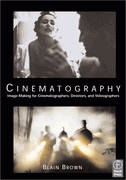
The student will shoot a variety of slide projects but differing greatly from those in Cinema 6. The class will practice lighting in all types of conditions and locales (exterior and interior), from a variety of different light sources. Each student will additionally complete a cinematography exercise either in film or digital. Costs vary between $100 - $500 depending upon scope of projects. This class is very challenging. Offered during the evening only.
Required Textbooks: Cinematography: Theory and Practice 2nd Edition by Blain Brown, - Focal Press - ISBN-978-0-240-81209-0. The Visual Story, 2nd Edition by Bruce Block ISBN: 978-0-240-80779-9.
CINEMA 9-1 - BEGINNING MOTION PICTURE AND TV SOUND (3 UNITS-CSU)
(4 hours per week)
Students learn the basics of motion picture production and post-production sound. Students use digital audio recorders, microphones, and booms and learn how to properly record sound. Students learn to loop and mix sound using a digital audio program.
Note: Enrolled students will be dropped and non-enrolled students may not add if not present at the first class session.
Prerequisite: NONEThis class leads to several certificates
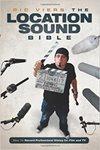
The student will learn the basics of production and post-production motion picture sound. Each will master the operation of various digital recorders as well as microphone placement and booming. Post-production techniques will be studied. Total cost of materials for class is approximately $100.
Required textbooks: The Location Sound Bible by Ric Viers
CINEMA 9-2 - INTERMEDIATE MOTION PICTURE SOUND AND POST PRODUCTION SOUND DESIGN (3 UNITS-CSU)
(4 hours per week)
Prerequisite: Cinema 9 or 9-1 with satisfactory grades or better.This class leads to several certificates
Intermediate television and cinema students are introduced to audio production, post-production software (ProTools™), and other elements of sound design to create final soundtracks for media productions. This course explores in depth aesthetic concepts and real world audio craftsmanship. This class is typically offered every other semester.
Required textbooks: The Location Sound Bible by Ric Viers.
CINEMA 10 - INTRODUCTION TO FILM DIRECTING (3 UNITS-UC/CSU)
(4 hours per week during Fall and Spring Semesters)
This is an introduction to the crafts of acting and directing for the film medium. Students will choose a script, cast it, rehearse their actors, and present a scene in class, along with a production package including script notes, scene goals, character analysis, storyboard, and shot list.
Prerequisites: Cinema 1, 2, 3, 4 with satisfactory grades or better.This class leads to several certificates
The student will be required to direct one or two scenes with actors. Each week new scenes will be presented which the class and the instructor will evaluate.
See Instructor for list of suggested texts.
Cinema 17 - Advanced Motion Picture Post-Production (3 UNITS)
An introductory course in post production finishing that covers the process of basic color correction, shot matching and the workflow required to create a final theatrical and broadcast delivery.Open to all Students
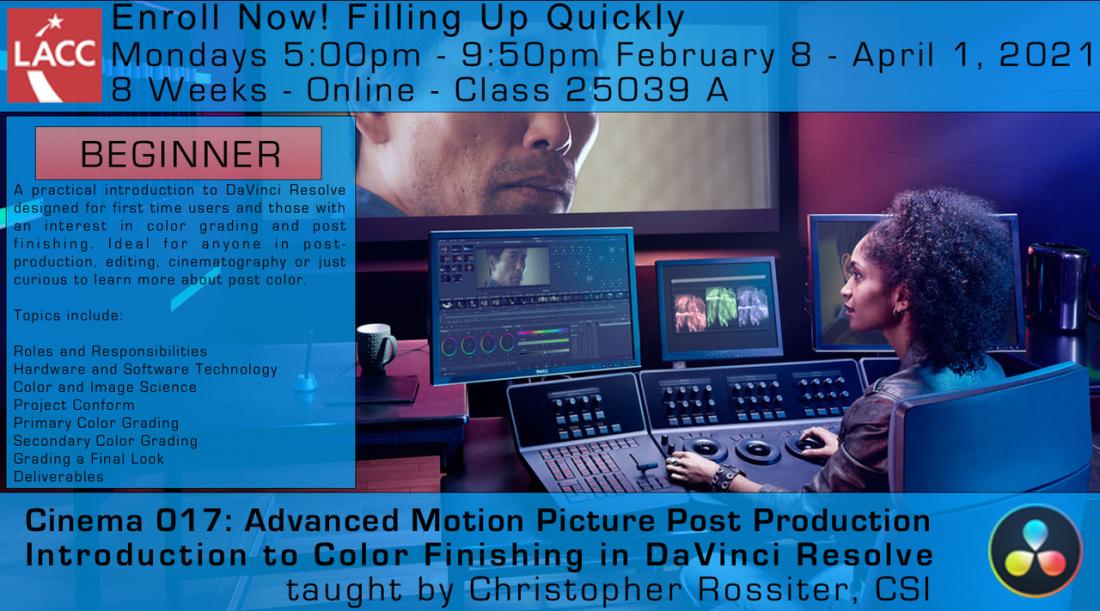
CINEMA 18 - INTRODUCTION TO FILM GENRES (3 UNITS-UC/CSU)
Students explore the main film genres along with the specific contributions of the major filmmakers in each genre, and the style and practices of studio production, marketing, and distribution. Each class includes the screening of a signification feature-length film that typifies or exemplifies that genre.
Book: An Introduction to Film Genres - Friedman et al.
Note: This class is offered in Face-To-Face and online formats
Open to all StudentsCINEMA 20 - BUSINESS OF MOTION PICTURE PRODUCTION (3 UNITS-UC/CSU)
(3 hours per week during Fall and Spring Semesters)
Students survey business practices of the motion picture industry, including the development, financing, production, and distribution of media content. Through individual and group collaboration in a workshop setting, students create a pre-production business package including a treatment, screenplay, business letter, bio, AD breakdown, production strip board, schedule, budget, storyboards, location sketches, and movie poster. Students work in groups to create and deliver a verbal pitch and presentation for a short film to an industry panel.
Prerequisites: Cinema 1, 2, 3, 4, with satisfactory grades or better.
This class leads to a Cinema Production Certificate
Many business aspects of film production are covered in this very comprehensive and challenging class. The instructor will emphasize the budgeting and scheduling of a motion picture using professional production forms and methods.
Required Textbook: Scheduling and Budgeting your Film - A Panic-Free Guide by Paula Landry
Note: This class is offered in Face-To-Face and online formats
CINEMA 25 - PRODUCING MOTION PICTURE FEATURES (3 UNITS)
This is a pre-production class.
Students research and prepare independent motion picture projects. Activities include: developing screenplays, researching state of the art media and business issues, analyzing professional production solutions, and creating business plans. Students will learn professional standards for intellectual property, privacy and publicity rights, as well as financing contracts, production issues, capture, distribution formats/outlets, and marketing. Students do case studies of contemporary "independent film" projects, including micro-budget films as well as low-budget films.
Open to all StudentsNote: This class is offered in Face-To-Face and online formats
CINEMA 32-1 - EDITING FUNDAMENTALS I (3 UNITS-CSU)
(4 hours per week during Fall and Spring Semesters)
Intermediate students develop editing skills using basic non-linear digital equipment.
Prerequisites: Cinema 1, 2, 3, 4, with satisfactory grades or better.
This class leads to several certificates
The student will work Apple Mac platforms to learn editing techniques. Primary work is done in Adobe Premiere™, The class emphasis will be on improving aesthetic editing skills, not software or assistant editing procedures. Projects will include cutting rushes from various films and TV shows and will be graded for correct editing. fundamentals. Scenes from feature films will be analyzed and basic editing techniques discussed.
No Required Textbook. Note: Enrolled students will be dropped and non-enrolled students may not add if not present at the first class session.
Note: This class is offered in Face-To-Face and online formats
CINEMA 32-2 - EDITING FUNDAMENTALS II (3 UNITS-CSU)
(5 hours per week during Fall and Spring Semesters)
Students develop advanced editing techniques and gain practical skills in visual effects, motion graphics, compositing, sound design, color correction, and finishing. Students gain workflow knowledge and explore the entire post-production process through footage provided in class and their own footage. Student will work in Adobe Premier™ and Avid™, with a possibility to become and AVID™ certified editor at the end of the class. Work will be screened and analyzed in class, and advanced techniques will be demonstrated and applied.
Prerequisites Cinema 32-1 with satisfactory grades or better.This class leads to several certificates
No Required Textbook. Note: Enrolled students will be dropped and non-enrolled students may not add if not present at the first class session.
CINEMA 33-1 and 33-2 - DIGITAL VIDEO PRODUCTION WORKSHOP I & II (3 UNITS-CSU)
(5 hours per week during Fall and Spring Semesters)
Intermediate film and television students will produce short video projects using digital video cameras and editing systems.
Prerequisites: Cinema 1, 2, 3, 4 or 33-1 (for 33-2) with satisfactory grades or better.
This class leads to a Cinema Production certificate
The student will shoot and edit two projects using a school provided digital video camera and video editing on Mac computers under the supervision of the instructor. (You may use your own camera or editing equipment if so desired).
CINEMA 38-1 - THE MOTION PICTURE GRIP (3 UNITS)
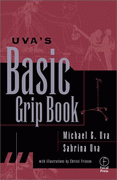
In this hands-on course, students learn basic grip skills and safe operation of grip equipment and tools presently in use in motion pictures, both in studio and on location. The equipment, tools, and safe practices include, but not are not limited to: C-Stands, Jr. Stands, Baby Stands, Overhead Stands, Flags, Nets, Diffusion, Butterflies, Gels, Diffusion, Aerial Lifts, Ladders, Dollies, Camera Support, Rigging, Knots, Cutting and Shaping Light, Manipulating Light, Lists and Schedules, Maintaining a Staging Area, Set Etiquette, Crew Hierarchy, Tools of the Trade, and Set Safety.
Note: This class is offered in Face-To-Face Only
CINEMA 38-2 - THE MOTION PICTURE ELECTRIC (3 UNITS)

In this hands-on course, students learn basic electric skills and safely operate electric / lighting equipment and tools presently used in entertainment industry both in studio and on location including, but not limited to Various Stands Used in the Electric Department, Use of Various Motion Picture Lights (tungsten, fluorescent, HMI and LED), Aiming and Positioning Lights, Types of Power, Load Calculations, Power Distribution and Management, Cabling, Electricity and Power Fundamentals, Electrical Rigging, Lighting Objectives and Methods, Manipulating Light, Creating Lists and Schedules, Knots, Ladder and Aerial Lifts, Meters, Maintain a Staging Area, Set Etiquette, Crew Hierarchy, Tools of the Trade and Set Safety.
Note: This class is offered in Face-To-Face Only
These courses (38-1 and 38-2) can be taken in any order. The electric class can be taken first or the grip class can be taken first. This is to allow students more hands-on experience than a single semester. (4 hours per week plus optional labs during Fall and Spring Semesters)
No PrerequisitesRequired textbooks: The Grip Book, 4th Edition by Michael G. Uva. Focal Press. Set Lighting Technician's Handbook, 4th Edition by Harry C. Box. Focal Press
CINEMA 60 - ENTERTAINMENT INDUSTRY CAREERS BELOW-THE-LINE PRODUCTIONS SKILLS I (3 UNITS)
(4 hours per week during some semesters)
This introductory course is designed to help students develop the skills needed to obtain and keep a position in the motion picture and television industries. Skills taught include working with production managers, first assistant directors, production designers, and script supervisors, with a focus on basic safety issues relevant to each department. Learn how to be a PA (Production Assistant)
No PrerequisitesRequired textbooks: The Complete Film Production Handbook, Fourth Edition, ISBN-10: 024081150X Eve Light Honthaner 2010
CINEMA 501 - MEDIA AESTHETICS AND DESIGN FOR FILM AND DIGITAL MEDIA (3 UNITS-UC/CSU)
(4 hours per week during Spring Semesters)
The student learns the analysis of film and modern visual media, including the cinema, television, the internet, advertising, social networking, and fine art. The student learns to examine the broad questions of form and content, aesthetics and meaning, and history and culture, exploring the diverse possibilities presented by the cinematic art form through an examination of a wide variety of productions, national cinemas, and film movements. Topics include modes of production, narrative and non-narrative forms, visual design, editing, sound, genre, ideology, and critical analysis. This course is recommended for all cinema and photography majors, and is open to graphic artists as well as the general public.
No Prerequisites (Advisory: Photography 7)Required textbooks: The Visual Story: Creating the Visual Structure of Film, TV and Digital Media, Bruce Block 2007. Film Art: An Introduction, Bordwell and Thompson 2012.
COOPERATIVE EDUCATION AND WORK EXPERIENCE: Cinema 911, 921, 931, 941 (1 - 3 UNITS - CSU)
Film and Television students receive credit for acceptable internships in the industry under the direction of supervising Cooperative Education director. Students meet virtually with the director and keep a diary of their work. Internship opportunities are made available to the Cinema-Television Department, but it is the responsibility of the student to secure one. This course is offered every semester and is repeatable. No textbook. The student must be enrolled in seven or more units at LACC (which may include up to four Co-op Ed units).
LAW 33 - LAW AND THE MEDIA (3 UNITS-UC/CSU)
(3 hours per week during some Spring semesters)
An overview of the legal aspects of the entertainment industry. Students learn the federal, state, and local laws that most directly affect mass communication in the United States, focusing on: a basic understanding of the American legal system, its institutions, and some of its terminology; a broad understanding of First Amendment principles as they relate to mass communication; and a working knowledge of the laws that directly restrict or enhance information gathering and message dissemination in the mass media, and an understanding of the rationales behind those laws.
This lecture class is offered by the Law Department and is an option for the Cinema Production Certificate.
Life at LACC
Learn more about the Cinema/TV program at LACC by following our Student Blogger Carmen!
Course Descriptions
Academic Programs: Cinema / TV
College Catalog
Class Schedules
Calendar of Classes & Events
List of Certificates and Degrees in Entertainment
Contact Us
Location
Cinema Television Department
Los Angeles City College
Communications Building (map)
855 N Vermont Ave
Los Angeles CA 90029
Contact
Jen Vaughn
Department Chair
Associate Professor of Cinema
Email: @email
Phone: (323) 953-4000 ext. 2631